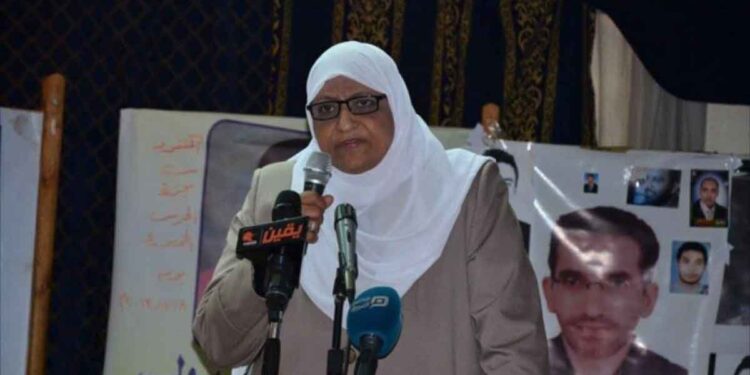The prisoner of conscience and Egyptian lawyer, Hoda Abdel Moneim, said that her health deteriorated, as she recently suffered from kidney disease and arterial thrombosis.
On Monday, she had a court session at the State Security Criminal Court, in the Tora Courts complex, during which she told the judges that the doctor who examined her health condition told her that she must have a cardiac catheterization, and she requested her release to get the necessary treatment and perform the operation.
Fadwa Khaled, daughter of lawyer Hoda Abdel Moneim, said on her Facebook page that “my mother’s health condition has deteriorated in prison, and she needs a heart catheterization, and she may need stents.”
“Mama told the judge that she got sick and had a heart attack where she needed immediate treatment and an EKG at the time, but it was done 20 days later, despite the doctor saying that the EKG should have been done when she felt sick.”, she added.
She added that the doctor told her mother: “I’ll be honest with you. Currently, there are no transfers to hospitals because they are full of cases of coronavirus.”
Fadwa questioned “What shall we do to get my mother out for treatment?” adding, “My mother is deprived of all her legal rights.”
The trial session of Hoda Abdel Moneim, the activist Aisha Al-Shater, and 30 other defendants were held, in what is known as the “Egyptian Coordination for Rights and Freedoms” case, and was postponed to November 9, 2021.
“Hoda” and “Aisha” were arrested on November 1, 2018, and accused of joining a banned group and receiving funding from abroad, along with nine others. Since then their detention has been renewed periodically, despite the deterioration of their health due to the harsh conditions of detention, medical negligence and being unable to receive the necessary health care.
It should be noted that the four members of the Egyptian Coordination have been held in prolonged and open pretrial detention for nearly three years without trial and in violation of the law prohibiting pretrial detention for more than two years.
They were arrested in March and November of 2018, and since then they have been subjected to a series of violations documented by Egyptian and international human rights organisations and United Nations groups, which considered their arrest arbitrary and demanded their immediate release.
Prisoners of conscience suffer from medical negligence in Egyptian detention facilities, which lack international technical standards for places of detention suitable for humans.
According to a statement by the Arab Organisation for Human Rights in the UK (AOHR UK), Egyptian prisons are overly crowded, where detainees suffer from malnutrition, lack of hygiene and the spread of insects and pollution amid lack of ventilation and lighting.
AOHR UK has repeatedly warned against the Egyptian authorities’ “indifference” to the lives of detainees for whom international laws and treaties impose the government’s responsibility for their treatment, especially in times of epidemics.
Since President Abdel Fattah El-Sisi assumed power in the country; the Egyptian authorities have been waging an unprecedented crackdown on dissidents and critics, arresting thousands in politically motivated arrests, many of whom have been convicted and sentenced in unfair trials, or held without trial for years on baseless terrorism-related charges, in very poor detention conditions.






























